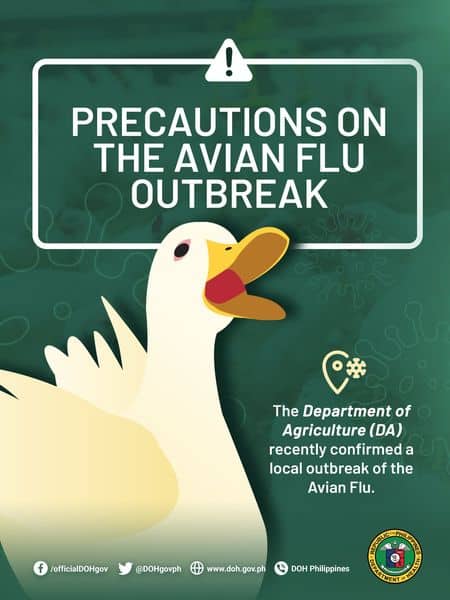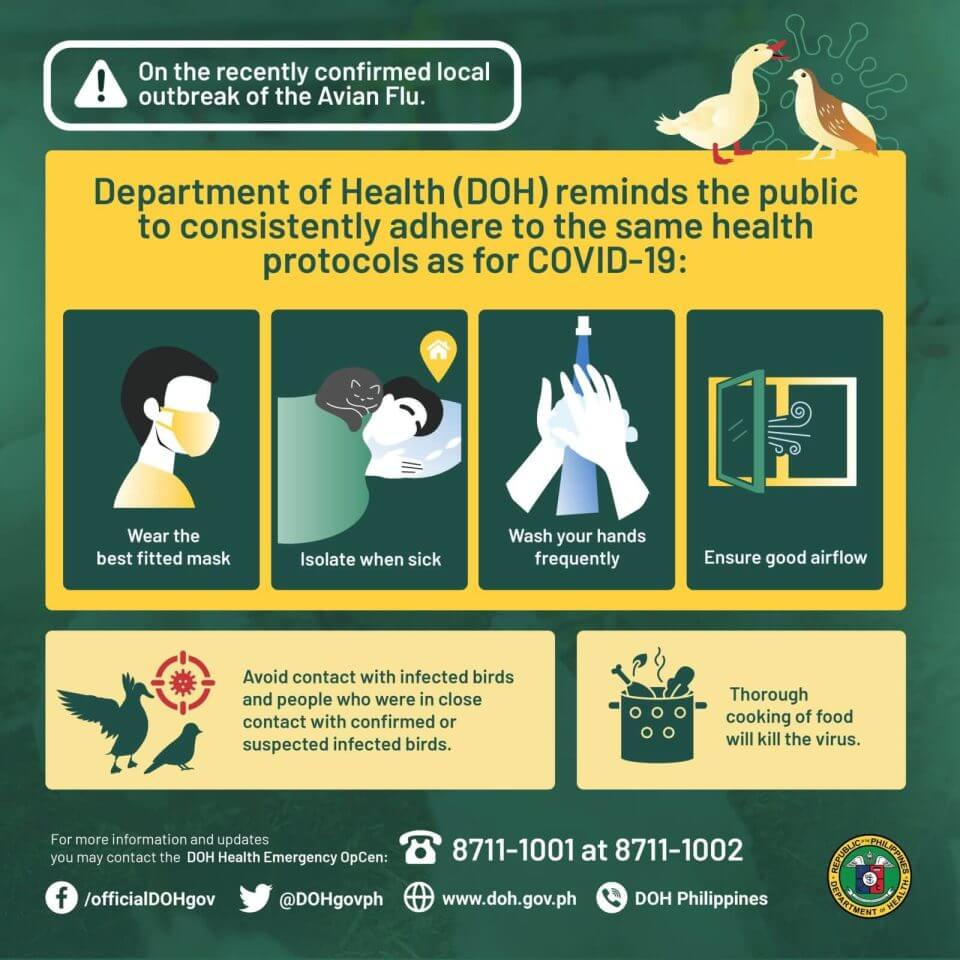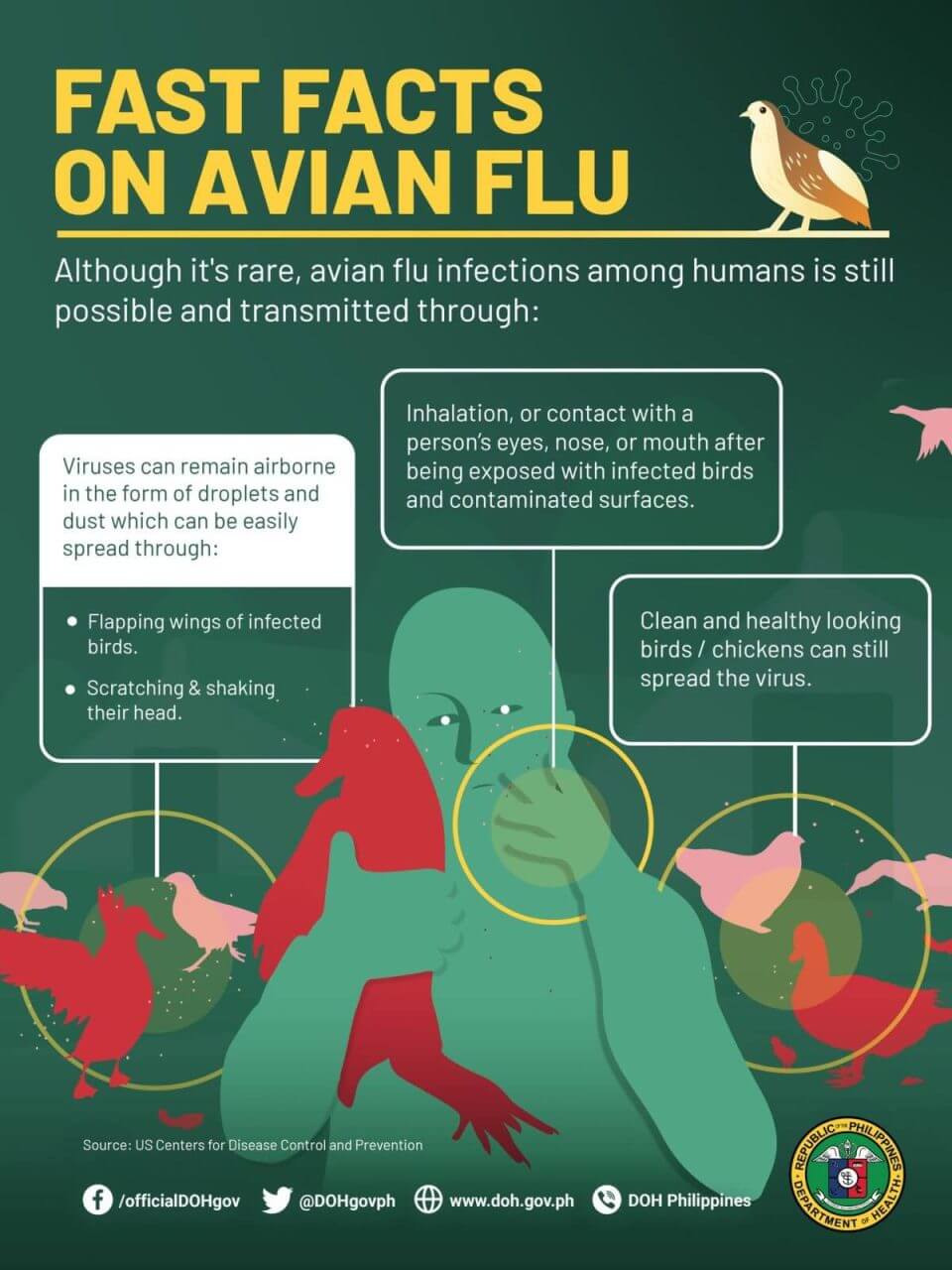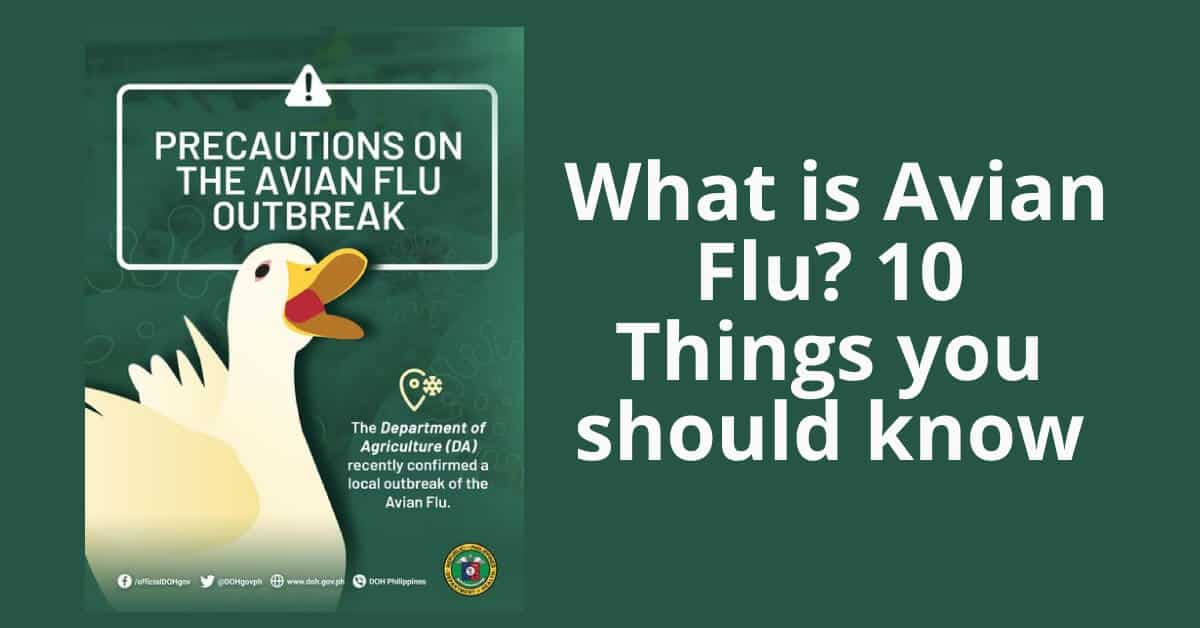The Department of Agriculture (DA) recently confirmed a local outbreak of the Avian Flu.
Avian flu is a contagious viral infection that affects birds.
Bird flu is an infectious disease that affects birds. It is usually caused by a type of virus called a coronavirus. There have been some cases of bird flu spreading to humans, but these cases involved extremely close contact. Most cases of bird flu involve wild birds. People should be careful about handling infected birds.




Always be aware and get the right information from the DOH, DA, or your respective local health offices.
DOH Health Emergency OpCen: 8711-1001, 8711-1002. #AlisAvianFlu #BeatBirdFlu
Here are 10 things you should know about Avian Flu.
1. What Is Avian Flu?
Avian flu is caused by an influenza virus called H5N1. It was first identified in 1997 in Hong Kong.
Since then, there have been several outbreaks of avian flu in poultry farms across Asia.
In 2003, there were reports of human cases of avian flu in Vietnam and Thailand.
However, these cases were rare and did not spread beyond those countries.
There have been no confirmed cases of human infections since 2004.
2. How Does Avian Flu Spread?
Avian flu spreads between birds via droplets in the air.
Birds usually do not show any symptoms of illness until after they become infected.
When they do, they may die within days.
Humans can catch avian flu from direct contact with sick birds or contaminated environments.
People can also catch avian flu from eating undercooked meat from infected animals.
3. Are Humans Vulnerable to Avian Flu?
Yes, although most people who contract avian flu do not develop serious symptoms.
Symptoms include fever, cough, sore throat, runny nose, muscle aches, headache, vomiting, diarrhea, and pneumonia.
Some people may experience severe respiratory problems and death.
4. How Can I Prevent Avian Flu?
To prevent avian flu, wash your hands frequently and thoroughly.
Wash them immediately after touching raw meat, poultry, or eggs.
Avoid close contact with sick or dead birds.
Do not eat uncooked meats or poultry.
Keep your distance from wild birds.
5. How Do Birds Get Infected With Avian Flu?
Most avian flu viruses infect chickens, ducks, geese, turkeys, ostriches, and pigeons.
They are transmitted from one animal to another via droplet transmission.
Droplets are small particles of water or saliva that travel in the air.
These droplets can land on surfaces and contaminate food and equipment.
Always be aware and get the right information from the DOH, DA, or your respective local health offices.
DOH Health Emergency OpCen: 8711-1001, 8711-1002. #AlisAvianFlu #BeatBirdFlu
6. How Is Avian Flu Treated?
The treatment for avian flu depends on the severity of the case.
For mild cases, patients receive supportive care such as rest, fluids, and pain relief.
Severe cases require hospitalization and oxygen therapy.
7. How Common Is Avian Flu?How common is avian flu?
According to the World Health Organization (WHO), avian flu occurs in many parts of the world.
Although it is uncommon in developed countries, it is still a concern in developing nations where hygiene standards are low.
8. Where Has Avian Flu Been Reported?
Avian flu has been reported in many places around the world.
The WHO estimates that over 60% of the world’s population lives in areas where avian flu is endemic.
This means that they live in regions where avian flu is commonly found.
The Department of Agriculture (DA) recently confirmed a local outbreak of the Avian Flu.
https://www.facebook.com/photo?fbid=352642650235847&set=pcb.352646016902177
9. Who Should Be Concerned About Avian Flu?
Anyone who eats chicken, turkey, duck, goose, ostrich, quail, pheasant, pigeon, guinea fowl, emu, or other birds should be concerned about avian flu. They are at risk of catching the disease.
Children, pregnant women, elderly people, and people with weakened immune systems are especially vulnerable to avian flu.
Those who work closely with birds are also at risk.
10. What Happens If I Contract Avian Flu?
If you have contracted avian flu, you will probably feel tired, weak, and have a fever.
You may also have a dry cough, sore throat, headaches, body aches, chills, nausea, and vomiting.
In some cases, you may experience difficulty breathing.
In rare instances, you may have seizures, coma, or even death.
It takes between two days and three weeks for symptoms to appear after exposure.
Can People Recover From Avian Flu?
People usually recover within a week.
However, if you get exposed to avian flu while traveling abroad, you might need additional time to fully recover.
Bird flu is serious! You should see your doctor right away if you develop a fever and start coughing. Tell him about your recent trip to an area where bird flu occurs. He’ll be able to tell whether you’ve been exposed to the virus.
Always be aware and get the right information from the DOH, DA, or your respective local health offices.![]() DOH Health Emergency OpCen: 8711-1001, 8711-1002. #AlisAvianFlu #BeatBirdFlu
DOH Health Emergency OpCen: 8711-1001, 8711-1002. #AlisAvianFlu #BeatBirdFlu
























